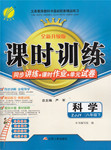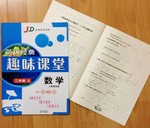题目内容
第一节
听下面5段对话。每段对话后有一个小题,从题中所给的A、B、C三个选项中选出最佳选项,并标在试卷的相应位置。听完每段对话后,你将有10秒钟时间来回答有关小题和阅读下一小题。每段对话仅读一遍。
1.Why can't Jack decide when to get married?
[ ]
A.He hasn't got enough money.
B.He doesn't like the house in the city.
C.They haven't found a suitable house.
2.What was the woman going to talk over with the manager?
[ ]
A.To go on hiring the house.
B.To discuss a problem.
C.To have the water pipe repaired.
3.Why did the woman go to the States?
[ ]
A.To do some business.
B.To go sightseeing.
D.To visit some friends.
4.What is true according to the conversation?
[ ]
A.Mr Green hasn't bought a new house.
B.Mr Green is busy painting his new house.
C.The Greens are getting ready to move in.
5.What did the woman want the man to do?
[ ]
A.To buy the pet dog some food.
B.To take care of the dog.
C.To find a place for the pet dog.
第二节
听下面5小段对话或独白。每段对话或独白后有几个小题,从题中所给的A、B、C三个选项中选出最佳选项,并标在试卷的相应位置。听每段对话或独白前,你将有时间阅读各个小题,每小题5秒钟;听完后,各小题将给出5秒钟的作答时间。每段对话或独白读两遍。
听第6段材料,回答第6、7小题。
6.Why is the boy feeling sorry?
[ ]
A.He couldn't get a copy of the magazine the girl wants.
B.He wants to read the magazine very much.
C.He has lost the girl's magazine.
7.What is true according to what you hear?
[ ]
A.The girl needs the magazine very much.
B.The girl has already read the magazine.
C.The girl wants her magazine back.
听第7段材料,回答第8、9小题。
8.What is the man going to Edinburgh for?
[ ]
|
A.Business. |
B.Filming. |
|
C.Sightseeing. |
9.Where does the conversation take place?
[ ]
|
A.On a plane. |
B.In a library. |
|
C.At a cinema. |
听第8段材料,回答第10~12小题。
10.What does “off – colour” mean in this conversation?
[ ]
A.It means “colours run”.
B.It means that someone doesn't feel well.
C.It means “colourless”.
11.How did the patient feel this morning?
[ ]
A.He felt as bad as last night.
B.He felt better than last night.
C.He felt worse than last night.
12.What is the patient's temperature?
[ ]
|
A.It is a little high. |
B.It is normal. |
|
C.It is a little low. |
听第9段材料,回答第13~16小题。
13.Where are the speakers?
[ ]
|
A.Underground railway. |
B.Bus stop. |
|
C.Waiting room. |
14.Which bus are they waiting for?
[ ]
|
A.Bus number seven. |
B.Bus number seventeen. |
|
C.Bus number seventy. |
15.What's the weather like?
[ ]
|
A.Hot and dry. |
B.Hot and wet. |
|
C.Rainy. |
16.When should the bus come?
[ ]
|
A.9:00. |
B.9:30. |
|
C.10:00. |
听第10段材料,回答第17~20小题。
17.When did the speaker get up every day in the past?
[ ]
|
A.At 5:00. |
B.At 5:30. |
|
C.At 6:00. |
18.What did the speaker have to do early every morning?
[ ]
A.Cleaned the bathroom.
B.Fed the chickens.
C.Helped his sister get dressed.
19.Why didn't the speaker and his sister go to school by bus?
[ ]
A.There was no bus running in the direction.
B.The school was quite near.
C.Their family was poor.
20.What did the speaker usually do on Sunday?
[ ]
A.Played in the street.
B.Stayed at home all day.
C.Went to church three times.
解析:
|
1.C;2.C;3.B;4.C;5.B;6.C;7.B;8.A;9.A;10.B;11.C;12.A;13.B;14.A;15.A;16.B;17.C;18.B;19.C;20.C Text 1 W:Jack, have you and Anne decided when you are going to get married? M:Next year, we hope, Mum. But we aren't sure about it. Finding a house is so difficult. Text 2 W:Hello, is that the manager? M:Yes , what's the matter? W:We are renting your house at 305 King Street and we have a problem with a broken water pipe. Text 3 M:Hi , Mrs Green. How was your trip to the States? W:It was wonderful. I really enjoyed it. I've been to many parts of the country and have lots of pictures taken there. Text 4 W:Hello, Mr Green. Have you moved into the house you bought last month? M:Not yet. We are busy shopping and putting everything in order. Text 5 W:Could you do something for me , please? M:What would you like me to do? W:Could you look after our dog while we are on holiday? M:Sure. Text 6 M:I'm terribly sorry. I lost the magazine you lent me the other day. W:It doesn't matter. I've read it. M:I've tried to get another copy but couldn't find one. W:Don't worry about it. I don't need it any more. Text 7 M:Are you going very far? W:To New York , actually. M:A beautiful city! Have you ever been there? W:No, I haven't. M:I think you'll like it. W:Which city are you going to? M:To Edinburgh. I have some business to do there. Would you like to read this book? It's very interesting. W:Yes, thank you very much. Text 8 M:Good morning. You are a new patient, I think. What is the trouble? W:Sometimes I feel cold and sometimes hot. I have a headache and a stomachache. M:Yes , you look a bit off-colour. W:What colour, please? M:Sorry , what I said was “off – colour” . It's a phrase we use to describe how someone looks or feels when he or she is not well. When did this start? W:Well, I felt very tired last night when I went to bed. Then I felt really bad this morning when I woke up. M:Yes , I see. Now , let's take a look at your temperature. Ah , just as I thought , your temperature is 39 degrees, which is a bit high. W:Oh, it isn't very bad, then. M:No, it isn't serious. Text 9 M:Excuse me. Have you been waiting long? W:About ten minutes. M:Did you notice whether the number seven bus has gone by? W:Not while I've been standing here. I'm waiting for the number seven myself. M:Good. Hot today , isn't it? W:Yes, it is. I wish that it would rain and cool off. M:Me, too. This is unusual for March. I don't remember it ever being so hot and dry in March before. W:No, it never did. M:We've just moved here, but we didn't know it would be so hot here. We should have gone to California. Do you think that we have missed the bus? W:No. It is always a little late. It never comes exactly on the half hour like it should. Text 10 Now, you want to know about life in the past. Right? I can tell you when I was a boy, things were different. I had to get up at six every morning. That was not very bad in summer, but in winter it was cold. And we didn't have any hot water in the house. We had to wash in cold water; we didn't have a bathroom. My dad had some chickens. I had to feed them every morning and then I had to walk to school with my little sister. It was two miles to school and two miles back in the evening. But it always seemed longer in the morning when we were going to school. There was a bus, but we didn't have any money. And we had to go to bed at seven o'clock every night. We couldn't watch TV because there wasn't any. On Sundays we had to go to church three times-morning, afternoon and evening. And we couldn't play outside on Sundays. But it wasn't all bad. We had some good times. We could go out and our parents didn't have to worry about us. There weren't so many cars on the roads then , so the streets were safe to play in. And there were not many robbers and thieves in those days. We had to work hard and we were't able to buy all those things in the shops today. Life was simple and people were happier. I don't think I like to be young today. |

 课时训练江苏人民出版社系列答案
课时训练江苏人民出版社系列答案 黄冈经典趣味课堂系列答案
黄冈经典趣味课堂系列答案 启东小题作业本系列答案
启东小题作业本系列答案听力测试
第一节
听下面5段对话。每段对话后有一个小题,从题中所给的A、B、C三个选项中选出最佳选项,并标在试卷的相应位置。听完每段对话后,你有10秒钟的时间来回答有关小题和阅读下一小题。每段对话仅读一遍。
1.Where does the talk take place?
[ ]
A.At a filling station.
B.At a chemist's.
C.In a post office.
2.Why doesn't the woman want to eat any more?
[ ]
A.Because she has eaten a lot.
B.Because she is afraid she will put on weight.
C.Because she thinks the cake is not delicious.
3.What does the woman NOT want with her tea?
[ ]
A.Milk.
B.Sugar.
C.Both milk and sugar.
4.When will the shop close?
[ ]
A.At half past four.
B.In an hour.
C.At five o'clock.
5.Why didn't Paul come to the party?
[ ]
A.Because he was busy.
B.Because he was ill.
C.Because he was on a trip.
第二节
听下面5段对话或独白。每段对话或独白后有几个小题,从题中所给的A、B、C三个选项中选出最佳选项,并标在试卷的相应位置。听每段对话或独白前,你将有时间阅读各个小题,每小题5秒钟;听完后,各小题将给出5秒钟的作答时间。每段对话或独白读两遍。
听第6段材料,回答第6、7小题。
6.What program does the man like?
[ ]
A.Information about flights.
B.Weather reports.
C.Introduction to interesting places.
7.What will the weather be like in the next three days?
[ ]
|
A.Rainy. |
B.Sunny. |
|
C.Snowy. |
听第7段材料,回答第8、9小题。
8.What advice does the man's wife need?
[ ]
A.Advice on growing flowers.
B.Advice on planting rice.
C.Advice on growing tomatoes.
9.Which is WRONG according to the advice of the woman?
[ ]
A.Plant different vegetables in the same field.
B.Grow tomatoes one year and another vegetable the next year.
C.Sow the seeds directly into the soil without doing anything extra.
听第8段材料,回答第10~12小题。
10.When will the man have a party?
[ ]
A.Next Sunday evening.
B.Next Saturday evening.
C.This Saturday evening.
11.Why does Clara say “It depends”?
[ ]
A.She does not know where to have the party.
B.She does not know what to do at the party.
C.She does not know when to attend the party.
12.What was the man's response to(对……回答)Clara's gift?
[ ]
A.He accepted happily.
B.He accepted unexpectedly.
C.He responded in a polite way.
听第9段材料,回答第13~16小题。
13.Where are the two speakers talking?
[ ]
A.They are talking in a hotel.
B.They are talking in a restaurant.
C.They are talking in a bank.
14.What is the exchange rate between the Swedish crown and the British pound?
[ ]
|
A.14. 45 to 1. |
B.14. 54 to 1. |
|
C.15. 45 to 1. |
15.How much does man want to change?
[ ]
|
A.150 pounds. |
B.150 crowns. |
|
C.150 dollars. |
16.How does the man feel when it's done?
[ ]
|
A.Worried. |
B.Sad. |
|
C.Satisfied. |
听第10段材料,回答第17~20小题。
17.Why did the boy's parents throw a carrot at him?
[ ]
A.Because the boy likes eating carrots.
B.Because the boy was doing the work slowly.
C.Because he was daydreaming he was very rich.
18.How long did the boy work in the morning?
[ ]
|
A.Two hours. |
B.Three hours. |
|
C.Four hours. |
19.Why didn't the boy do his homework?
[ ]
A.Because he was naughty.
B.Because he was scolded (责备) by the teacher.
C.Because he worked in the morning and were tired.
20.How long did the boy work at the weekends?
[ ]
|
A.For three hours. |
B.For fifteen hours. |
|
C.For five hours. |
第一节
听下面5段对话。每段对话后有一个小题,从题中所给的A、B、C三个选项中选出最佳选项,并标在试卷的相应位置。听完每段对话后,你将有10秒钟时间来回答有关小题和阅读下一小题。每段对话仅读一遍。
1.What does the woman's answer mean?
[ ]
|
A.Friendly. |
B.Sadly. |
|
C.Rudely. |
2.What time did Julie leave?
[ ]
|
A.At 8: 00. |
B.At 8: 50. |
|
C.At 8: 15. |
3.What is the man going to do?
[ ]
A.He wants the woman to fix his watch.
B.He will call her when the watch is fixed.
C.He wants her to fix the watch in one week.
4.What will the woman do for the man?
[ ]
A.She has a pencil and paper for him.
B.She has enough notes for both of them.
C.They will be friends after class.
5.What does the man suggest to the woman?
[ ]
|
A.Buy a second bicycle. |
B.Buy a used bicycle. |
|
C.Buy a new bicycle. |
第二节
听下面6小段对话或独白。每段对话或独白后有几个小题,从题中所给的A、B、C三个选项中选出最佳选项,并标在试卷的相应位置。听每段对话或独白前,你将有时间阅读各个小题,每小题5秒钟;听完后,各小题给出5秒钟的作答时间。每段对话或对独白读两遍。
听第6段材料,回答第6、7小题。
6.Where does this conversation probably take place?
[ ]
|
A.In front of a hotel. |
B.In the street. |
|
C.At the garage. |
7.What's wrong with the woman?
[ ]
A.She missed the way to her hotel.
B.She forgot her hotel's name.
C.She couldn't find a taxi.
听第7段材料,回答第8、9小题。
8.What is the most probable relation between the two speakers?
[ ]
|
A.They are friends. |
B.They are strangers. |
|
C.They are scientists. |
9.Where does the conversation take place?
[ ]
|
A.On a train. |
B.On a bus. |
|
C.On a plane. |
听第8段材料,回答第10~12小题。
10.What does the man need?
[ ]
|
A.A taxi. |
B.A timetable. |
|
C.A bag. |
11.When will the man leave home?
[ ]
|
A.At 2: 30. |
B.At 3:00. |
|
C.At 3: 30. |
12.What does the man want the driver to do?
[ ]
|
A.Drive carefully. |
B.Be on time. |
|
C.Carry his bags. |
听第9段材料,回答第13-15小题。
13.Why does the woman not like spring in this city?
[ ]
A.Because it is very hot.
B.Because it seldom rains.
C.Because it is seldom sunny.
14.Which of the following does the woman not like?
[ ]
A.Taking a bus to work.
B.Having a rest on the beach.
C.Climbing mountains.
15.Why does the man like climbing mountains?
[ ]
A.Because he does not have to take a bus to work.
B.Because he can enjoy the beautiful scenery.
C.Because he never feels exhausted.
听第10段材料,回答第16~18小题。
16.Who was George?
[ ]
A.He was an American visitor.
B.He was a Londoner.
C.He was a hotel manager.
17.How much does the doctor usually charge his patients?
[ ]
A.£ 2 for the first visit, and £ 1 for later visits.
B.£ 2 for the first visit , and £ 1.50 for later visits.
C.£ 1.50 for the first visit, and £ 1 for later visits.
18.What do we know at the end of the story?
[ ]
A.George got some good medicine from the doctor.
B.George managed to save 50p.
C.The doctor knew that he had never seen George before.
听第11段材料,回答第19、20小题。
19.How long has Paul Newman played in movies?
[ ]
|
A.For 13 years. |
B.For 30 years. |
|
C.For 45 years. |
20.When did he start his business?
[ ]
|
A.In 1959. |
B.In 1982. |
|
C.In 1988. |